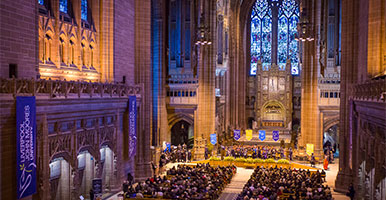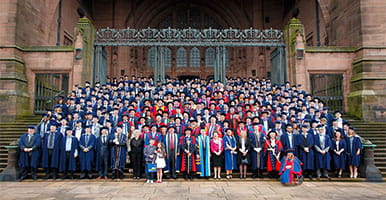Bill Bryson OBE
Presented by Professor Frank Sanderson
Bill Bryson, is one of the world's favourite writers. He is a sharp and perceptive observer of people and places, a brilliant user of language and a well-informed traveller of the world. His books are accessible, insightful and always liable to make the reader laugh.
Canadian journalist Linda Richards perhaps gets close to an accurate description of him when she says:
Bill Bryson is mild of voice and manner. Gentle, even charming in a sweet and innocent sort of way. He speaks rapidly, yet succinctly, articulating his thoughts - in person and on paper - in a no-nonsense manner that, nonetheless, always leaves room for fun. In his travel books, Bryson looks at places baldly, unmasks any natural humour that might be lurking, gives us a glorious glimpse and then moves on. In personal as well as professional style Bryson is the perfect blend of all that has influenced him. An American with a British soul.
Bill was born in Des Moines, Iowa, in 1951 into a family of journalists: both his parents and his elder brother worked for the local papers, and Bill felt it inevitable that he would end up working with words in some way.
He had a very happy childhood growing up in 1950s America: it was a time of great optimism, a booming economy, and with none of the privations being experienced in Europe at that time. He studied Political Science at Drake University in Des Moines and was, quote, so far from being an exceptional student that he took 7 years to complete a 4-year degree.
Bill left Des Moines simply because life seemed to be more exciting elsewhere. A backpacking expedition in 1973 brought him to England where he met his wife Cynthia, a psychiatric nurse at the time. They settled first in Bournemouth for 10 years, before moving to Kirkby Malham, North Yorkshire.
He was inevitably drawn towards journalism and his first job was sub-editor with the Bournemouth Daily Echo, which required him to forget his Americanisms and relearn the English language. He also learned about British irony, unknown in America, and became so enthused with it that it permeates all of his work.
Subsequently, he worked for Financial Weekly and The Times, and was one of the founding journalists on The Independent, and wrote travel articles to supplement his income.
Although described as a travel writer, Bill is not entirely comfortable with the description, commenting recently:
I never intended to become a travel writer at all and I still don't really think of myself as one. I am just some guy who writes books. I have always seen myself as a pen for hire, happy that people will pay me to write stuff. It just so happens that travel was the direction it went.
In 1989 his first travel book The Lost Continent was a great success. Further success followed with Mother Tongue, Neither Here Nor There, and Made in America. Then, shortly before returning to the States, Bill took one last trip around Britain, leading to the very funny best-seller about Britain, Notes From a Small Island.
Other highly regarded books since then have included, A Walk in the Woods in which he assumed the persona of Daniel Boone to walk the Appalachian Trail; Bill Bryson's Dictionary of Troublesome Words, Neither Here nor There: and Travels in Europe.
Having attained the financial independence of a best-selling author, Bill moved back to the States with his family in 1996 "just because he could" and because it would be a good experience for the children.
Settling in Hanover, New Hampshire, he then wrote a column for The Mail on Sunday about his experiences in becoming reacquainted with the land of his birth, the accumulated columns becoming another best-selling book, Notes from a Big Country.
Whilst in America he missed our sense of humour. He recalls the time he went through customs and immigration at Boston, and the official said as he went past 'Any fruit or vegetables?' and Bill said 'OK, I'll have four pounds of potatoes if they are fresh' and was surprised when the joke wasn't appreciated. But I have a sneaking suspicion that a British Customs Officer wouldn't be that amused either.
In 2000, Down Under was published to coincide with the Sidney Olympics. It recounts Bill's experience of Australia, a place he describes as "Baywatch with cricket". He notes in the book that Australia is one of the world's best-kept secrets, completely ignored by Americans - he did a search on news stories about Australia in The New York Times and found that it rated about the same attention in America as Burundi and Belarus.
In 2002 he published Bill Bryson's African Diary, full of wry observations and humour about Kenya. All the author's royalties and publishers' profits go directly to CARE International, an independent humanitarian organisation working to end world poverty through sustainable development programmes - £300,000 has been raised so far.
His prize-winning science book, A Short History of Nearly Everything, published in 2003, was inspired by his realisation that he didn't know the first thing about the only planet he was ever going to live on. The result was a warmly received book, with scientist John Waller concluding that: "It's hard to imagine a better rough guide to science"
The book's major impact was confirmed when the Royal Society awarded Bill the prestigious 2004 Aventis Prize for science writing, against strong competition from professional science writers. It was praised by the judges as an "ambitious book which will communicate science to the widest possible audience in an intelligent and highly accessible way."
He donated the prize cheque to charity.
Having returned to England in 2003, Bill Bryson misses the Boston Red Sox, as if cricket, or rounders for that matter, wasn't more than an adequate substitute for baseball. He and his family now live in Norfolk, and he has been drawn ever more into the fabric of British life since his return.
In 2003, he was appointed as a Commissioner for English Heritage and is a passionate defender of the organisation's work to promote understanding and appreciation of historic buildings and landscapes.
in 2004 he received an honorary Doctor of Civil Law degree from the University of Durham, and
in 2005, he was appointed Chancellor of the University of Durham, replacing the late Sir Peter Ustinov
In February 2005, Bill launched a call to improve the protection of Britain's ancient trees and woods alongside The Woodland Trust and the Ancient Tree Forum.
It is good to know that world traveller Bill Bryson has a special affection for Liverpool. It is his favourite English City.
He said in Notes from a Small Island:
"Maritime commerce brought Liverpool not just wealth and employment, but an air of cosmopolitanism that few cities in the world could rival, and it still has that sense about it."
He did however observe when he came here in the early 1990s, that Liverpool felt as though it had more of a past than a future.
He returned briefly in 1998 when Notes from a Small Island was made into a TV series, and he keeps a close eye on developments in the city. He sees that much progress has been made in the last decade, he believes the Capital of Culture accolade is well-deserved and that the city now has a distinctly rosy future.
However, given his role as a Commissioner for English Heritage, he does wish that they would stop demolishing the Victorian terraces.
Bill Bryson, a guy who writes books, 'a man who suffers so his readers can laugh', an American with a British soul, has enriched our culture with his presence and we are proud to honour him today.
Thus I have pleasure in presenting Bill Bryson, this most distinguished person, for admission to our highest honour of Fellow of Liverpool John Moores University.



